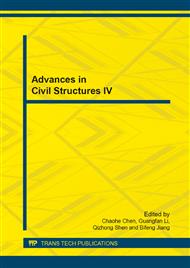p.987
p.991
p.995
p.1000
p.1007
p.1012
p.1016
p.1020
p.1024
Cracking Analysis and Reinforcement Method for a Thin-Wall Plain-Concrete Pier
Abstract:
In view of the rapid development of the high-speed rail construction in China at present, some new plain concrete piers of railway bridges cracked in an increasing trend. Combining a real project, this paper analyzed the causes of the cracking in massive concrete piers through the actual construction condition and the materials prosperities, and made corresponding prevention and improvements for the cracking, provided the reinforcing treatment of cracking piers with corresponding programmes. The analysis and treatment measures for the project will present a reference for the similar projects in the future.
Info:
Periodical:
Pages:
1007-1011
Citation:
Online since:
July 2014
Authors:
Price:
Сopyright:
© 2014 Trans Tech Publications Ltd. All Rights Reserved
Share:
Citation:


